Playing B-flat major chords on baritone ukulele is the same as playing A major chords—just one fret higher (toward the bridge). I recommend learning the A major chords first. Then all you have to do is slide up one fret for the B-flat chords.
In this article we cover five different ways to play B-flat major chords. At the end, I’ve included an Appendix for Theory Nerds, to show where a B-flat major chord appears in the keys that you’ll typically be using on baritone uke.
If you need to review the five basic major chord shapes in their open and moveable shapes, check out this article with lots of full-color diagrams.
Note: Bb major and A# major are the same chord.
Color key:
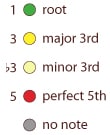
B-flat Major – Option 1
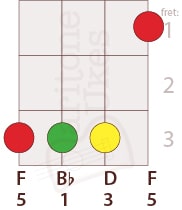
For option 1, go to the 1st fret and use the moveable A major shape.
Beginners sometimes get mixed up between B-flat major and B major. The basic B-flat major chord is played on the first fret and B major is played on the second fret. A helpful way to remember this is that B-flat major is “flat up against” A major. In other words, B-flat and A major are one fret apart, whereas B major and A major are two frets apart.
Here is the music notation for option 1:
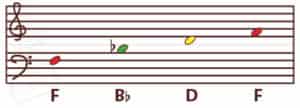
Tip: There are five moveable chord shapes you can use to play major chords across the neck on baritone ukulele. Commit to learning them!
B-flat Major – Option 2
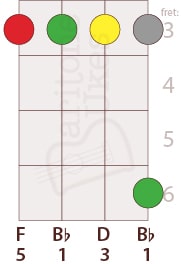
For option 2, move to the 3rd fret and use the moveable G shape to make a B-flat major chord.
Here’s how option 2 looks in music notation:
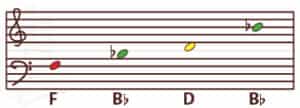
B-flat Major – Option 3
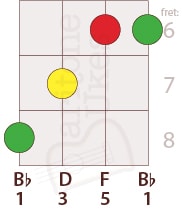
For option 3, move to the 6th fret and use the moveable E shape for another way to play a B-flat major chord.
Here’s what option 3 looks like in music notation:
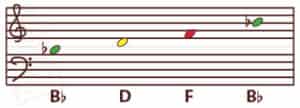
B-flat Major – Option 4
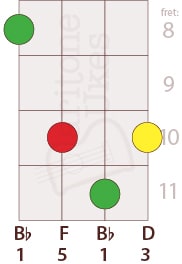
For option 4, move to the 8th fret and use the moveable D shape to play a B-flat major chord.
Many players find this shape to be rather difficult. But even if you skip this position (you can choose option 3 or option 5 instead) it’s still helpful to understand the shape and how it fits into the sequence with the other shapes.
The sequence of the shapes is explained in more detail below. Meanwhile, notice how each shape begins where the previous shape ended.
Here is option 4 in notation:
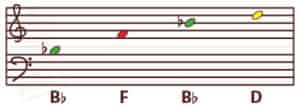
B-flat Major – Option 5
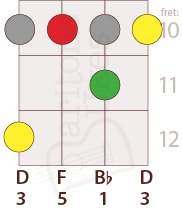
For option 5, move to the 10th fret and use the moveable C shape to play a B-flat major chord.
Here is what option 5 looks like in music notation:
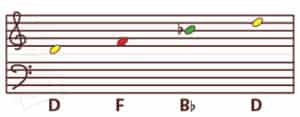
How to remember the order of the chord shapes as you move across the neck
Let’s review the options above. To play a B-flat major chord, use these shapes:
- moveable A shape – 1st fret
- moveable G shape – 3rd fret
- moveable E shape – 6th fret
- moveable D shape – 8th fret
- moveable C shape – 10th fret
Remember that there are five moveable shapes you can use to play major chords across the neck. Use these five shapes on different frets to play all the major chords on baritone ukulele.
You can easily remember the order in which to use these shapes with the word CAGED. Whichever shape you start with, continue with the next shapes in order of the letters in the word CAGED.
For example, to play B-flat major chords on baritone ukulele, we begin with the A major shape on the 1st fret (see option 1 above). The next shape will be the G shape, because G comes after A in the word CAGED. After that, the next shape will be the E shape, and so on.
This is called the CAGED method. This sequence works for every major chord.
For more options for playing chords across the neck, check out my article about the CAGED method for baritone ukulele. I spent weeks on those illustrations. Hope you find them helpful!
Appendix for Theory Nerds
This chart shows you where a B-flat major triad occurs, in terms of scale degree, in the six easiest keys for baritone ukulele.
I recommend focusing on the six easiest keys for baritone uke, and using a capo if you absolutely must play in other keys.
Some ukulele and guitar teachers recommend focusing on just two keys, C major and G major. I think that’s a great idea, for starters. But for baritone ukulele, I also recommend working with the key of D, because D is the lowest note on your bari uke.
Learning those three keys, and how to use a capo, will allow you play almost popular any song. But, at the most, I would stick to the six easiest keys for baritone ukulele.
Getting back to our B-flat major chords and the 5 options shown above, any particular major chord functions as a different scale degree in different keys. Like this:
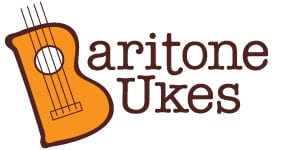


0 Comments